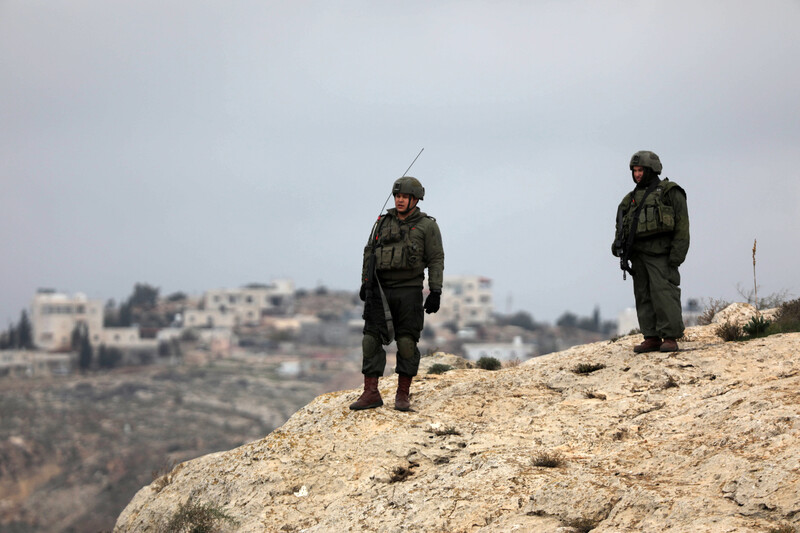Rights and Accountability 22 December 2021

Israeli soldiers stand guard as settlers erect tents and mobile homes on Palestinian land near the Kiryat Arba settlement in the occupied West Bank city of Hebron, 17 December.
APA imagesA new bill in Finland would ban the import of goods from Israeli settlements built on occupied Palestinian and Syrian land.
“Palestinians are suffering from the longest occupation in modern history and Israeli policies that systematically breach international law and violate human rights,” said Veronika Honkasalo, the Left Alliance lawmaker who introduced the legislation. “We must stop supporting the illegal Israeli settlements.”
The bill does not name any specific country.
It would apply to any internationally recognized situation of military occupation and colonization, including potentially Western Sahara or Crimea.
“Legislation of this sort is entirely supportive of and consistent with international law,” said Michael Lynk, the UN special rapporteur on human rights in the occupied West Bank and Gaza Strip.Lynk, an independent expert appointed by the UN Human Rights Council, was speaking at a 15 December panel chaired by Honkasalo.
“It’s consistent with the decisions of the United Nations,” Lynk added, “and most importantly, it’s consistent with a rights-based approach that could truly result in a just and durable peace in the Middle East.”
There are now about 700,000 Israeli settlers living in almost 300 colonies across the West Bank, including East Jerusalem, and another 20,000 in Syria’s Golan Heights – all built since Israel occupied the territories in 1967.
The illegality of Israel’s settlements is “exceptionally clear,” Lynk said, noting that the UN Security Council has declared their construction a “flagrant violation” of international law on at least seven occasions.
The Rome Statute, the founding document of the International Criminal Court, defines settling civilians in occupied territory as a war crime.
More than four decades ago, the UN Security Council called on all states “not to provide Israel with any assistance to be used specifically in connection with settlements in the occupied territories.”
Lynk said that language was “wide enough” to “include any trading relationship with these settlements, because that provides these settlements with the economic oxygen that they need in order to be able to be sustained and to be able to grow.”
Brussels can’t block it
Honkasalo’s bill is not the first effort in a European Union country to ban imports from settlements.
Ireland’s Occupied Territories Bill, which has the same aim, won majorities in both houses of that country’s parliament.
However, the Irish government is blocking its implementation on the grounds that it would clash with EU law.
But that pretext was swept away earlier this year. Following a court ruling, the EU was forced to acknowledge that banning settlement goods is a trade matter, rather than a form of sanctions.
That arcane distinction has major legal implications, according to Tom Moerenhout, an expert on international economic law who teaches at New York’s Columbia University.
It means that individual EU member states like Ireland and Finland are within their rights to ban settlement goods without permission from Brussels, Moerenhout told the 15 December panel.
Under international law states are obliged not to recognize or assist the illegal annexation or colonization of occupied territory, Moerenhout said.
Even though the EU does not provide Israeli settlement goods with preferential treatment under its trade agreements with Israel, it still allows them regular access to its markets.
This is a form of “implicit recognition” of the settlements, Moerenhout explained.
Model for other countries
Supporters of Honkasalo’s legislation, which is not likely to come to a first vote before spring, will now need to build support for it among Finnish lawmakers.
While that will undoubtedly be hard work, there are grounds to build on.
“In Finland there is actually a longstanding commitment by the Social Democratic Party, shared by the social democratic parties in Sweden, Norway and Iceland, that they have committed to working towards international bans on settlement products,” said Syksy Räsänen, a physicist who chairs ICAHD Finland, a nonpartisan group that advocates for Palestinian rights.
The Social Democrats currently head the coalition government in Helsinki
The bill would “partially fulfill the obligation of the Finnish state not to recognize an illegal situation,” Räsänen told the panel.
This is because it would only ban imports, without addressing the other ways that foreign businesses support illegal colonization through investment, financing or providing services to settlements.
But according to Räsänen, the bill would still shift the treatment of settlements away “from the framework of power politics and relations between states, to being more guided by human rights goals and more based on international law.”
Although her bill is in its earliest stage, Honkasalo said she has already received inquiries from lawmakers in other countries who are interested in using her legislation as a model for their own initiatives.
“I’m very happy how much positive feedback this bill has gained,” Honkasalo said.





Comments
Long live BDS!
Permalink Edward U Huguenin replied on
The way to "deal" with BDS is to treat israel with disdain and shun all those that support its crimes. Eventually this will force israel to start obeying the law and return to its legally defined 1948 borders and stop killing Palestinians men women and children and thereby start acting less like a rogue criminal terrorist state that routinely commits war crimes, crimes against humanity, genocide and Apartheid in order to steal land and resources belonging to other countries.
Boycotting Israel
Permalink Anonymous replied on
Everyone should be Free including the Palestinian people Free Palestine
Crimea is NOT occupied, unlike ALL Palestine
Permalink lidia replied on
Crimea's population had voted to join Russia (to which Crimea had been a part since the end of 18th). Zionists are the colonizers of Palestine and have NO right to Palestine at all.